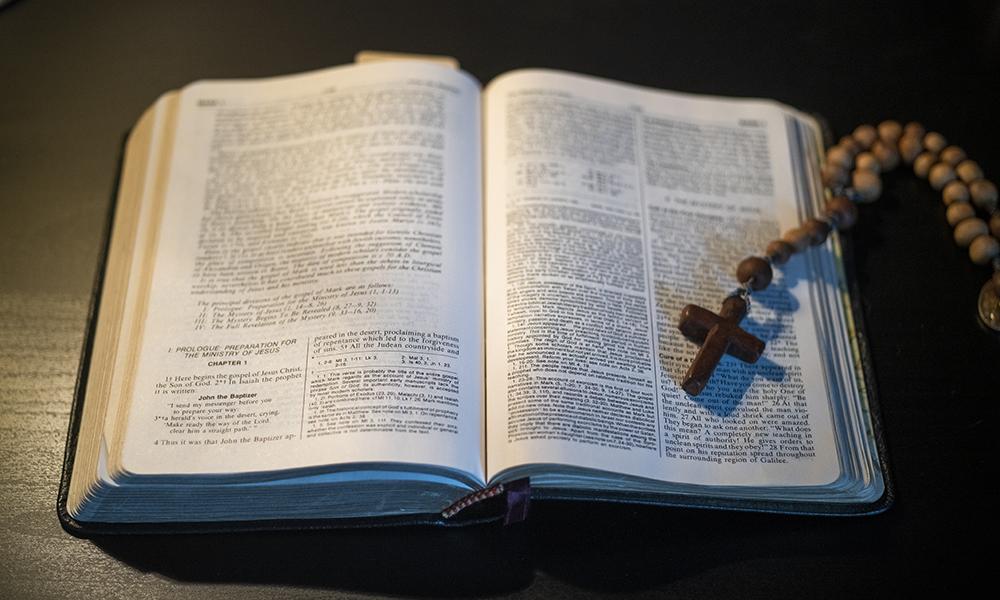
Prudence Will Watch Over You – Part 5
Welcome to the next installment of our moral discernment of COVID-19 vaccination. We continue this week with our reflection on disease and health in the Bible.
Last week, we heard how the authors of the Old Testament perceived a deep connection between sin and disease: both represent the wound upon creation that God had promised to heal. We also explored how God’s Law saw disease and evil as public problems, which affect everyone and require the contribution of the whole community to overcome. And we also encountered one of the great questions of the Hebrew prophets and sages: when the physical, economic, and social effects of disease and sin fall disproportionately on the weakest and most vulnerable, what will God do to establish justice?
Jesus, the Great Physician
This difficult question receives a dramatic answer in the New Testament. In the Gospels, Jesus Christ first becomes famous (Mark 1:27-28) as a healer of diseases of both body and soul, as He cures the sick and drives out evil spirits. In the healing stories of Jesus’ early ministry, Scripture once again explores the connection between sin and disease, but this time with an emphasis on God’s power to overcome both of these forces. The Lord has both the power and the desire to help those who suffer (Mark 1:40-45), including us in our present moment.
The Gospels make it clear that Jesus’ healing miracles show us that He came to undo all of the consequences of the Fall: to restore health to those who suffer, to forgive the sins of the whole world, and to return the isolated and quarantined (“lepers”) to the fulness of their communities. His desire and purpose is for us to “have life, and have it more abundantly” (John 10:10).
On one occasion, Jesus directly addressed the issue of why God permits sin and disease to affect the innocent (John 9:1-41). While they were travelling, the disciples saw a blind man and asked the Lord, “Who sinned, this man or his parents, that he was born blind?” In other words, they are echoing the Old Testament understanding that sin and disease are related in some mysterious way. Jesus’ answer gives a profound insight into God’s purposes for creation: “It was not that this man sinned, or his parents, but that the works of God might be made manifest in him.” God only allows evil in the world because He is planning to bring a greater good out of the midst of that evil.
The Redemptive Suffering of Christ’s Body
The idea that Jesus came to restore all things brings us to the greatest healing God has brought about: the Resurrection of Jesus from the dead. Death is the apparent triumph of disease and sin—but when Jesus rose from the grave, He made it clear that the truly “contagious” thing is now the power of life (I Cor 15:20-28). For anyone who, like Job, was wondering why an all-powerful and loving God would allow death and disease, we now know: it was so that Christ Himself could die, and in dying, destroy sin and death forever (Hebrews 2:14-15). This is the answer to Job’s riddle of what God can do to establish justice and health in a fallen creation.
Since we ourselves are part of Christ’s body, we share with Him in His redemptive suffering and rising. As St. Paul says, “If one member suffers, all suffer together; if one member is honored, all rejoice together” (I Cor 12:26). Joined to the suffering of Christ, we have the privilege of sharing in all things and working for the good of all (II Cor 1:1-7). Through Christ, the solidarity of the human family in sin has been transformed into solidarity in righteousness and health.
St. Paul also writes frequently about healing as a gift of the Holy Spirit (I Cor 12:27-28). The way the Lord truly works through some people to bring about healing is a sign of Jesus’ on-going presence in power among us, as the lives and intercession of the saints shows us so clearly. At the same time, we should be clear that God Himself considers the ability to work miracles of healing to be one of His less important gifts (I Cor 12:31). An immature faith requires signs, but mature faith means acting in love, even when we do not understand everything. In other words, if the present pandemic does not cause us Catholics to grow in charity, in joyful self-sacrifice for the sake of others, and in willing responsibility for others’ needs, we will have failed to receive the Lord’s greatest gift (I Cor 13:1-13).
The Church, the Field Hospital
With all that in mind, what does the gift of love look like? We can begin by noticing that Jesus did not just perform healings Himself, but He also gave His disciples authority to participate in His work of healing (Mark 6:7-13). This mission continues today: as Jesus’ disciples, we have the same mission to relieve human suffering. This takes the form of both prayer for and help to the afflicted, which includes both sacramental anointing (James 5:13-16) and all works of mercy.
We should also keep our eyes focused on our ultimate destination: eternity with God. The portions of the New Testament which speak about the end of all things remind us of two truths that are very relevant right now. First, we are called to be people of hope. Disease is one of the effects of sin that will be destroyed in the end, along with every source of sadness and pain (Revelation 21:4). In St. Paul’s inspiring words, “the sufferings of the present time are not worthy of comparison with the glory that is to be revealed to us” (Romans 8:18).
Second, Scripture is very clear that we are accountable for our actions and choices, even when times are difficult. We sometimes get hyper-focused on the grand visions of the Book of Revelation, but when Jesus describes the end of times, He lays out a judgment based on very simple criteria: “I was hungry and you gave Me food, I was thirsty and you welcomed Me, I was a stranger and you welcomed Me, I was naked and you clothed Me, I was sick and you visited Me” (Matthew 25:35-36). Here at the beginning of Lent, this can be an examination of conscience for us: our Lord is immune compromised—are we wearing masks? Our Lord is poor and lacks insurance and internet access—are we helping Him get a vaccine? Our Lord is unborn—do we speak in favor of medical research that better respects His life? Our Lord lives in a third world country—are we advocates for His health, too?
The Way of Prudence
As you can see, even without mentioning vaccines, the Scriptures provide us with profound insights into the moral and spiritual dimensions of our present moment. In the next article, we will bring together all of our reflections so far into a combined perspective of Scripture, Tradition, and the Magisterium’s teaching. May God bless us all in our Lenten observances, giving us His wisdom so that we may receive health of body, mind, and spirit!
(This article first appeared in the Feb. 19, 2021 issue of the One Voice newspaper.)


